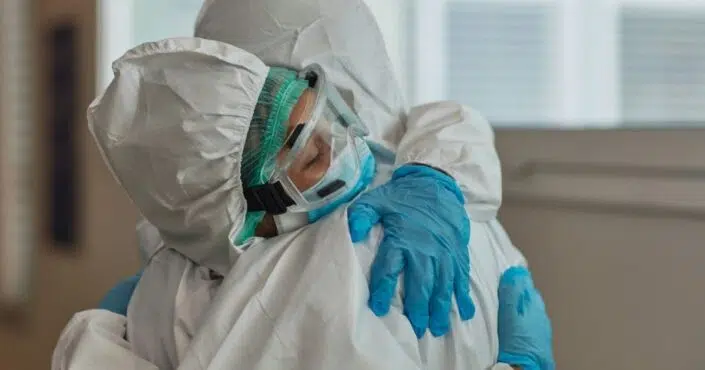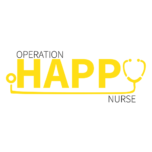As nurses, we’re likely to experience some form of trauma on the job. It’s a high-stress career. Nurses in any setting may experience traumatic events. We’ve also seen post-traumatic stress disorder (PTSD) on the rise within the medical field since the beginning of the pandemic. Those working in COVID units, emergency departments, ICU settings, mental health services, and trauma or burn units are especially susceptible to experiencing traumatic events. These fields of nursing often learn of some of the darkest human behaviors, and see things that can’t be unseen.
When you’re on the job, your mind is almost always on high-alert. We anticipate emergencies even on the slowest days. Over time, traumatic events and the stress can wear on us mentally and physically. It’s vital that we do not remain silent when something bothers us. We have to take care of ourselves in order to take care of others. After all, we’re only human.
What is PTSD?
Post-traumatic stress disorder wasn’t nationally recognized or named until the 1970s. Research ramped up in the 1960-1970s as many Vietnam War Veterans returned to the United States. People noted their family members and friends displayed similar symptoms. Many soldiers showed signs of detachment, night-terrors, flash-backs, irritability, rage, violence, drug and alcohol abuse, etc. Researchers began to look closer into the trends of soldiers returning home. (If you ever want to read more about it, I highly recommend “The Body Keeps Score” by Bessel van der Kolk.)
The Diagnostic and Statistical Manual of Mental Disorders (DSM), recognizes symptoms of PTSD to include intrusion, avoidance of thoughts and/or behaviors, negative mood and changes in thoughts, and changes in arousal and reactivity. These symptoms include things like:
- Repeated dreams related to the event.
- Bodily reactions like increased heart rate or blood pressure when reminded of the event.
- Avoiding people, places, activities, or memories linked to the event.
- Self-blame or blaming others.
- Detachment from people or activities that previously brought joy.
- Issues remembering important aspects of the event.
- Difficulty concentrating.
- Impulsive or self-destructive behavior.
- Hyper-vigilance.
- Issues sleeping.
For more information, visit the American Psychiatric Association.
The diagnosis of PTSD begins with a noted exposure to one or more traumatic events. Traumatic events may involve death or threatened death, actual or threatened serious injury, and/or actual or threatened sexual violence. Exposure to an event may be experiencing it directly, witnessing it happen to someone else, or learning about another person’s trauma.
What Symptoms Do Nurses Experiencing PTSD Display?
After learning more about PTSD, it’s no surprise that many nurses experience some degree of PTSD. As I’m writing this, I’m recognizing several traumatic events I’ve experienced during my career as a nurse. Many times, we’re told to hold it together and be strong for the families, so we bottle up the emotions we’re feeling.
We have very little time to sit with our emotions or heal between shifts. The expectation is that we come back the next shift ready to work. At times, it might feel like the event never even happened, because we are forced to move on so quickly. Unfortunately, this is sometimes the nature of the job.
Nurses who have experienced a traumatic event may have recurring dreams about the situation, loss of sleep, fatigue, irritability, or indifference to the job as a means of limiting their emotions. Other nurses may turn to drugs and/or alcohol to cope with the stress. Some may feel self-blame. For instance, “If I had recognized the symptoms sooner, maybe my patient would be alive.” You may find a nurse who avoids certain rooms because of a traumatic event they experienced.
What Can You Do?
Talk about the situation that is troubling you. This is a huge step in facing PTSD. It is not shameful to feel emotional, sad, anxious, depressed, angry, or any emotion linked to the event. It does not make you weak to feel, it only makes you human.
I’ve found talking about my personal experiences therapeutic, especially with others who went through the same or similar events. Group therapy, or access to a therapist to work closely with the staff and patients on your unit is crucial.
Finding a therapist who specializes in PTSD treatment is extremely helpful. Cognitive behavioral therapy, group therapy, eye movement desensitization and reprocessing (EMDR), and brainspotting are all forms of PTSD therapy that have proved successful.
If you don’t feel like you’re at the point where you want to find a licensed-professional therapist, here are some ways you can aid in your own mental-health progress.
- Practice mindfulness. Whether it’s a daily yoga practice, 10-minute morning meditation, keeping a gratitude journal, etc. Mindfulness practices boost our mood, relieves stress, lowers blood pressure, treats chronic pain, and allows us to remain more present in the current moment.
- Try a yoga nidra class. This is a form of “sleep yoga” where you move into a deep state of conscious awareness sleep. Researchers claim one hour of yoga nidra sleep equates to about four hours of regular sleep!
In the early 2000s Walter Reed Army Medical Center studied the effects of nidra on soldiers experiencing PTSD. This study had such notable results, that many VA facilities implemented yoga nidra to their treatment programs.
There is also proof that yoga nidra reduces anxiety more effectively than meditation. Other benefits include a boost in the immune system, lower cortisol levels, and regulation of endocrine imbalances. Yoga nidra also slows brain waves allowing the brain and body to rest and heal, while reducing symptoms of chronic pain. The benefit list goes on and on, so if you’ve never practice nidra, I highly recommend looking into it. - Engage in support groups. Our NICU has a ton of committees, including a bereavement committee that not only focuses on our patients and families, but also the staff. When a patient dies, we try to sit with all involved for a debrief right after the event. After about a week, we meet again with our unit therapist to talk through how we’re feeling as caretakers and as human-beings. If your unit doesn’t have a committee like this, look into forming one. You’ll be surprised how many people benefit from it. If you don’t have access to a therapist, work with your employer to look into their Employee Assistance Program (EAP), or find a personal therapist who specializes in PTSD psychotherapy.
- Take part in pet therapy, or adopt your own pet. Owning a pet, or spending time around another person’s pet is emotionally beneficial. Pets bring out feelings of love, joy, and companionship. They also help reduce stress. It’s extremely rewarding to train them and watch them grow. Pets are also a great reason to get outdoors and go for a walk/hike while enjoying nature (specifically dogs, although I do love to see a cat on a leash).
Written by Claire Lang BSN, RN





Excellent Claire! Consider yourself hugged!
This RN so agrees with all you said…I will need to check out the type of yoga you mentioned as it’s new to me but stretches have been vital to this 63 year old body! Along with my standing desk❣️
I was blessed to care for families in Labor and Delivery for 24 years so I heartily agree with you on the value of bereavement times…to take the time to grieve together, sometimes we are the only ones that can really understand the mix of feelings that come with the deep sweet privilege of being a witness and walking with another to witness the bravery of another walking through suffering…sometimes there are no adequate words and I praise and thank the One who made us with the gift of tears.
After the past two years these wise words are so valuable!
I know I hope many nurses will read them, put them into practice and model them for others, patients as well as coworkers.
I thank you for them and will put them to good use as I now care for people aka warriors, living with Sickle Cell Disease these days.
I am a experienced Psychiatric nurse looking for mental health jobs in New Jersey with good paying agency. I believe Vivian health care is the best
Thanks Stella! Browse our job board (https://www.vivian.com/browse-jobs/landing) to find current job listings that might meet your needs. You can also find salary information and travel job postings for psychiatric nurses in New Jersey here: https://www.vivian.com/nursing/psychiatric-nurse/travel/new-jersey/salary/ and travel job postings for mental health nurses in New Jersey here: https://www.vivian.com/nursing/mental-health/travel/new-jersey/salary/. We also have permanent staff positions if that’s your preference. Feel free to use the “Contact Vivian” option under the Resources tab to reach our 24/7 help desk with any questions about the website. Best of luck in your job search!
Thank you for this, I had a trigger cost me a really good job recently. Really struggling to get back on my feet.
Dear We’re only human,
While all those suggestions/advice are great. I feel it’s looked down upon to go to your director and tell them you are struggling with a traumatic issue related to a patient. It’s almost as if you are received with “Great, now I have something else on my plate to deal with.” Our hospital is small. There has been ONE time in the past 10 years I can recall they hired a bereavement counselor to come to our ED so we could discuss our feelings. It was due to losing two co-workers in a relatively short time frame from a traumatic car accident, one overdose and one death to COVID. (Although we have lost several employees to COVID) None, of my coworkers, nor myself were even aware they had hired someone to come and speak with us. It was during shift change so that made it even more difficult. Not to mention talking in a group is not something everyone is comfortable with. I feel most nurses come from some sort of trauma background so how do you work through 30 years of trauma and the “recent event” that triggered all those feelings?
I agree that all your suggestions are great ways to help alleviate stress and PTSD. Let’s face it. Should we not as caretakers be aware of why we are in healthcare to begin with? What is our childhood trauma that made us yearn for the daily fight and flight feelings that most of us are so addicted too? Is this not something that should have been addressed in nursing school? I don’t know all the answers but it seems to me that we can’t expect to “fix” one area of healthcare when the whole world could use some one on one therapy.
I think too many people do not understand the street nurses bear, especially since COVID hit. Personally I am no longer working because the thought of having COVID again brings me to tears. To add to the situation. I can not get the COVID vaccine due to having a Guilluan Barre reaction to the flu shot, so other than my natural immunity I will not have protection. It really stresses me out. Thank you for your article it helped me feel not so alone.